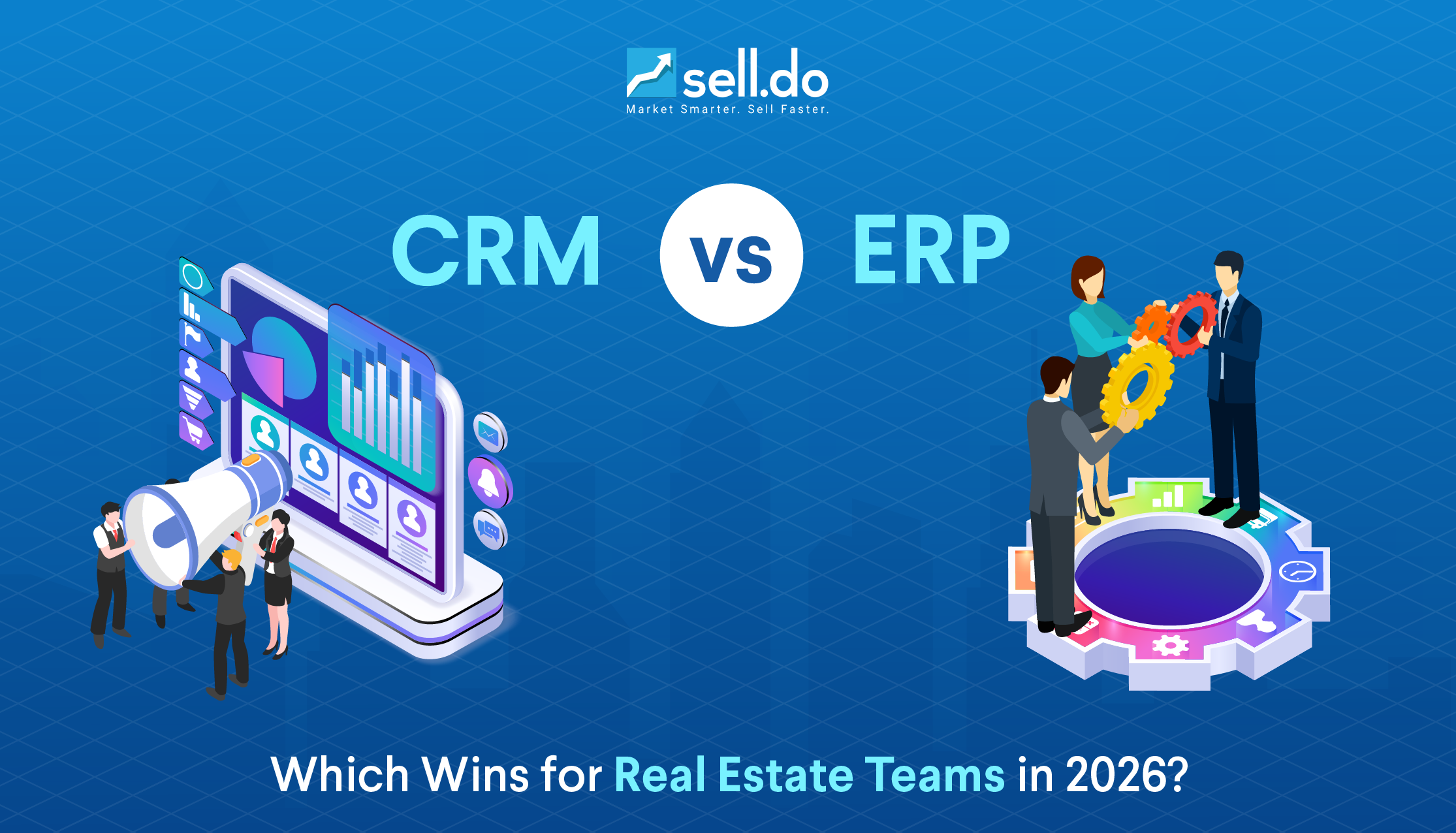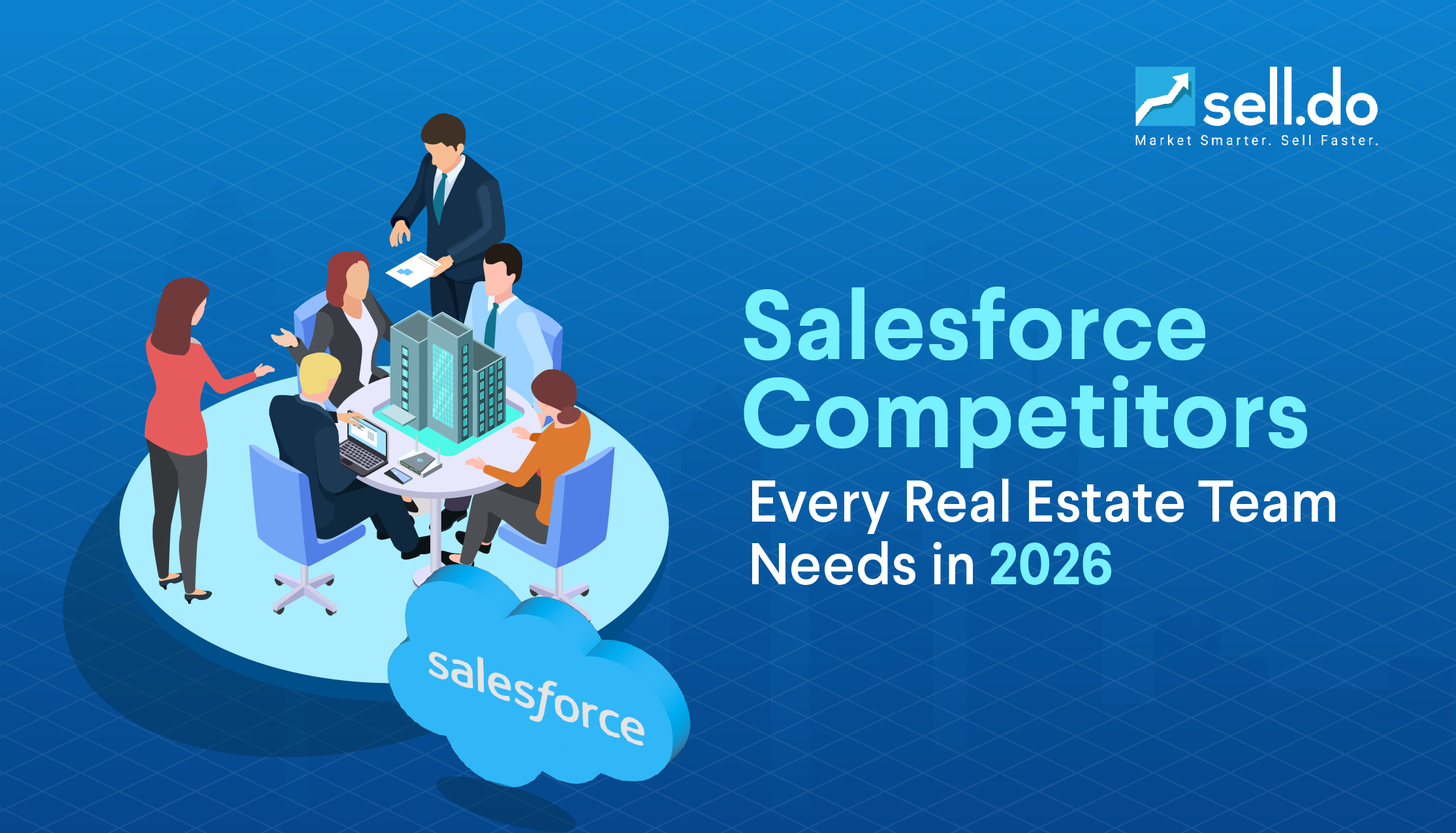You must be well aware of the impact of CRM on improving your real estate sales productivity and efficiency. This ultimately results in more sales in an industry where the buying cycle is long.
Technological advancements have advanced CRM systems into an end-to-end sales and marketing software that streamlines your sales and marketing cycle. New-age CRMs not only manage the leads and sales processes but also give sales insights on each and every marketing campaign.
“Taking the decision to automate is just the beginning; a systematic execution with the right steps is the key to winning.” – Mr. Praveen Kumar, CEO, Sell.Do.
So you need to ensure that your real estate CRM strategy is applied perfectly at every step so that your business evolves in sales productivity and efficiency, resulting in a good percentage of increase in the final sales.
Based on our experience of implementing CRMs for multiple real estate companies we have listed down a few pointers on how you can implement an effective CRM strategy for real estate.
Choose the Right CRM Partner
There are multiple CRMs available today with a number of companies pitching their services at an attractive price. It’s important not to opt for a CRM that doesn’t create an impact on your sales and that your sales and pre-sales team find confusing to use.
There are a few things that you need to make sure while selecting the right CRM.
-
Is the product well-suited for your industry?
Every industry has a different objective that they want to achieve with the help of a CRM. For e-commerce, the object is to increase repeat purchases. For real estate, the objective is to manage leads and the sales pipeline.
You can check, Sell.Do, it’s exclusively designed as per the real estate processes, through inputs from multiple experts in the industry.
-
Is the product easy to use and navigate?
There are multiple CRMs available in the market that may have a good feature list but they are not helpful when it comes to navigation and easy operation. Your team requires an easy-to-use CRM that lets you do things efficiently.
-
Do they have a dedicated support team?
You would have, some time or the other, purchased software and ended up not being able to use it as you had no support. A similar situation can happen with your CRM. You need to make sure that the CRM you buy has a dedicated support team that is available to solve your queries, a support team who has an understanding of your business processes.
Define Your Company’s Sales Cycle
Once you have decided the CRM that suits your requirements, you need to map your sales cycle or process that you will follow. You need to figure out how your leads will follow across your teams. Plan out when the transition that should happen from pre-sales to sales and decide the criteria for the sales team to push the leads back to pre-sales.
The most common cycle that is followed in real estate is that once a lead has been entered in the system, it is assigned to pre-sales. A pre-sales representative has the initial conversation with the leads, enters additional details like interested project or unit in the system and sends the project brochure trying to push the lead for a site visit. Once the lead is ready for the site visit, the pre-sales team pushes the leads to the sales representative for that particular project. He/She then takes forward the conversation, sends the price quote and pushes the lead for closure.
The sales cycle that you will define will be transited as a workflow in your CRM.
Define the Lead Stages Based on that Cycle
Depending on your sales cycle, you need to design your sales funnel and define the lead stages in the funnel. Describe the criteria for pushing the lead from one stage to another in the lead funnel.
A typical sales funnel for real estate companies is - Incoming, Prospect, Opportunity, Negotiation, Booking, Lost, Unqualified.
Whenever you receive a new lead it is defined as Incoming. Once a first contact is made with the lead it is marked as Prospect. If a site visit is scheduled then it will be Opportunity. After the sales representative sends a price quote to the lead, the stage is changed to Negotiation. Finally, once the booking is done the lead is marked as Booked. If the lead’s requirement doesn’t meet the project specifications, it’s marked an unqualified lead and if the lead doesn’t opt for your project for some other reason like booking an alternative project then it is marked as a lost lead.
The lead stage you define will be entered into the system and will be used to track all your leads and sales performance.
Set the Team Hierarchy and Data Access Selectively
There is a lot of data and reports generated in your CRM. You need to make sure that each sales or pre-sales representative has access to only the data that is required by him/her. All the sales representatives don’t need to have access to everything.
For this, you need to define your team hierarchy that will be installed in the CRM. Basis this, the sales manager of a project will have access to lead data and sales report of the sales team of that particular project. A sales representative will have access to data of leads assigned to him/her. And the sales head will have access to all data and reports.
Setup Your Entire Inventory
In real estate, inventory management is complicated as there are multiple projects containing multiple towers, floors, and units. Even units are further categorized in terms of size and configuration.
Your complete inventory needs to be stored in the CRM. The pre-sales team can add the exact unit for each lead with respective value. The sales team can actually hold or book a particular unit which will not be available for any other pre-sales or sales representative for booking. It prevents multiple bookings on a single unit and makes the final sales stage very easy for the sales team.
So, list down your complete inventory in terms of individual units to be entered into the CRM.
Install e-mail and SMS Templates
Your sales and pre-sales teams should maintain a consistent messaging defined by your marketing team. This will promote smarter messages and prevent mis-selling. Your marketing team should create email/SMS templates to be sent at a different stage or action point as per the consumer cycle.
These templates can be installed in the system and enable the sales team to send them with just one click.
Automate Your Workflow for Effortless Selling
Make sure that your CRM providers automate your sales cycle and the workflow that you have defined. It will eliminate time-consuming tasks and cut down thousands of wasted work hours.
Thus, enhance sales productivity, increases sales rate and improve revenue.
Online Training
Once you have set up your system and it is ready to use as per your process, team structure, and workflows you need to incorporate it into your company’s sales and pre-sales team for use.
It is essential they are well-versed with the complete usage of the product so that they apply each and every feature available as per your sales cycle. Only if they use the CRM, as you want it, you will get the desired reports and insights.
Make sure that your CRM vendor gives a detailed training to each and every pre-sales and sales rep in the company.
If you are planning to set up a perfectly designed CRM for real estate, contact us. Our product specialist will guide you through the complete process of setting up a CRM and will provide online/offline training to all your sales and pre-sales team members.
Sell.Do has been listed at the top among the list of best real estate CRM by various platforms,
Trick Machine | Software Suggest






Leave a comment
Comments (0)
Be the first one to comment.